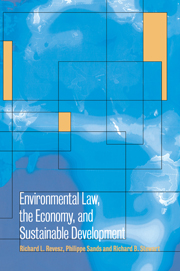 Environmental Law, the Economy and Sustainable Development
Environmental Law, the Economy and Sustainable Development Book contents
- Frontmatter
- Contents
- List of contributors
- Introduction: environmental regulation in multi-jurisdictional regimes
- PART I ENVIRONMENTAL REGULATION IN FEDERAL SYSTEMS
- PART II ENVIRONMENTAL REGULATION AND INTERNATIONAL TRADE
- PART III CHOICE OF ENVIRONMENTAL POLICY INSTRUMENTS
- PART IV THE ENVIRONMENTAL STANDARD - SETTING PROCESS
- 10 Institutions for regulating risk
- 11 Science and international environmental policy: the Intergovernmental Panel on Climate Change
- PART V INTERNATIONAL ENVIRONMENTAL LAW AND SUSTAINABLE DEVELOPMENT
- Index
11 - Science and international environmental policy: the Intergovernmental Panel on Climate Change
Published online by Cambridge University Press: 03 May 2010
- Frontmatter
- Contents
- List of contributors
- Introduction: environmental regulation in multi-jurisdictional regimes
- PART I ENVIRONMENTAL REGULATION IN FEDERAL SYSTEMS
- PART II ENVIRONMENTAL REGULATION AND INTERNATIONAL TRADE
- PART III CHOICE OF ENVIRONMENTAL POLICY INSTRUMENTS
- PART IV THE ENVIRONMENTAL STANDARD - SETTING PROCESS
- 10 Institutions for regulating risk
- 11 Science and international environmental policy: the Intergovernmental Panel on Climate Change
- PART V INTERNATIONAL ENVIRONMENTAL LAW AND SUSTAINABLE DEVELOPMENT
- Index
Summary
Pollution due to human activities on a local scale, of air, water, or land, has been around for a very long time. What is relatively new and what is giving rise to much current environmental concern is the existence of human activities which lead to pollution on the global scale – pollution emitted by one person locally that has global effects. One example is the release of small quantities of chemicals containing chlorine, such as chlorofluorocarbons (CFCs), that cause damage of global extent to the ozone layer in the stratosphere. Another example relates to emissions of “greenhouse gases” (GHG) such as carbon dioxide that spread through the whole atmosphere and result in climate change with its potential deleterious effects. The existence of global environmental problems requires solutions that are organized on a global scale. Scientists and policymakers worldwide have to respond to this imperative and find appropriate ways of meeting the challenge. In this chapter I address in particular the issue of human-induced climate change and describe the role which scientists have played in assisting in the determination of policy.
Formation of the Intergovernmental Panel on Climate Change
During the 1980s it began to be recognized that the increasing use of fossil fuels was resulting in a substantial increase in the concentrations in the atmosphere of the GHG, carbon dioxide and methane. Estimates were made that the carbon dioxide concentration could double before the end of the twenty-first century.
- Type
- Chapter
- Information
- Environmental Law, the Economy and Sustainable DevelopmentThe United States, the European Union and the International Community, pp. 353 - 366Publisher: Cambridge University PressPrint publication year: 2000
